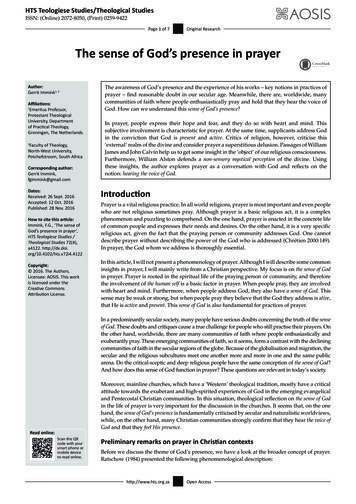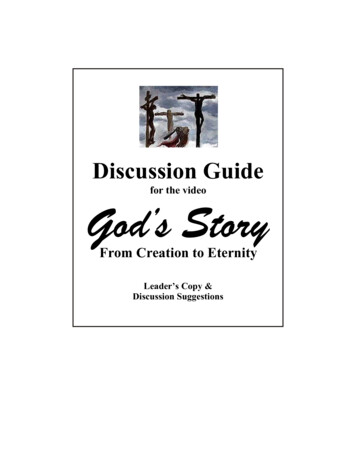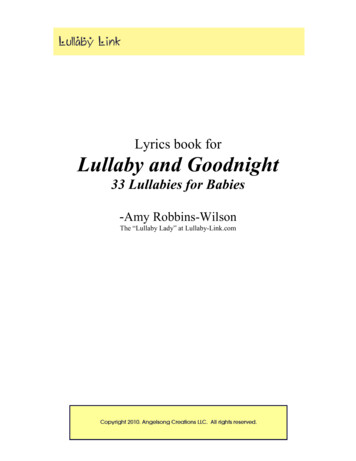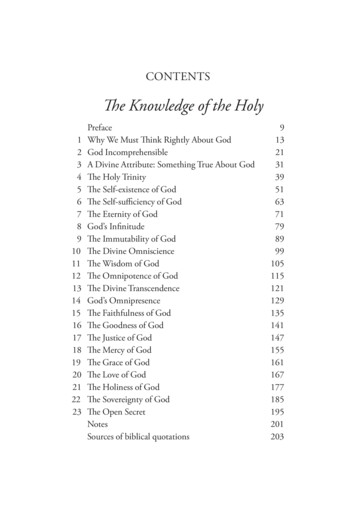
Transcription
HTS Teologiese Studies/Theological StudiesISSN: (Online) 2072-8050, (Print) 0259-9422Page 1 of 7Original ResearchThe sense of God’s presence in prayerAuthor:Gerrit Immink1, 2Affiliations:1Emeritus Professor,Protestant TheologicalUniversity, Departmentof Practical Theology,Groningen, The NetherlandsFaculty of Theology,North-West University,Potchefstroom, South Africa2Corresponding author:Gerrit Immink,fgimmink@gmail.comDates:Received: 26 Sept. 2016Accepted: 12 Oct. 2016Published: 28 Nov. 2016How to cite this article:Immink, F.G., ‘The sense ofGod’s presence in prayer’,HTS Teologiese Studies /Theological Studies 72(4),a4122. http://dx.doi.org/10.4102/hts.v72i4.4122Copyright: 2016. The Authors.Licensee: AOSIS. This workis licensed under theCreative CommonsAttribution License.The awareness of God’s presence and the experience of his works – key notions in practices ofprayer – find reasonable doubt in our secular age. Meanwhile, there are, worldwide, manycommunities of faith where people enthusiastically pray and hold that they hear the voice ofGod. How can we understand this sense of God’s presence?In prayer, people express their hope and fear, and they do so with heart and mind. Thissubjective involvement is characteristic for prayer. At the same time, supplicants address Godin the conviction that God is present and active. Critics of religion, however, criticise this‘external’ realm of the divine and consider prayer a superstitious delusion. Passages of WilliamJames and John Calvin help us to get some insight in the ‘object’ of our religious consciousness.Furthermore, William Alston defends a non-sensory mystical perception of the divine. Usingthese insights, the author explores prayer as a conversation with God and reflects on thenotion: hearing the voice of God.IntroductionPrayer is a vital religious practice. In all world religions, prayer is most important and even peoplewho are not religious sometimes pray. Although prayer is a basic religious act, it is a complexphenomenon and puzzling to comprehend. On the one hand, prayer is enacted in the concrete lifeof common people and expresses their needs and desires. On the other hand, it is a very specificreligious act, given the fact that the praying person or community addresses God. One cannotdescribe prayer without describing the power of the God who is addressed (Chrétien 2000:149).In prayer, the God whom we address is thoroughly essential.In this article, I will not present a phenomenology of prayer. Although I will describe some commoninsights in prayer, I will mainly write from a Christian perspective. My focus is on the sense of Godin prayer. Prayer is rooted in the spiritual life of the praying person or community, and thereforethe involvement of the human self is a basic factor in prayer. When people pray, they are involvedwith heart and mind. Furthermore, when people address God, they also have a sense of God. Thissense may be weak or strong, but when people pray they believe that the God they address is alive,that He is active and present. This sense of God is also fundamental for practices of prayer.In a predominantly secular society, many people have serious doubts concerning the truth of the senseof God. These doubts and critiques cause a true challenge for people who still practise their prayers. Onthe other hand, worldwide, there are many communities of faith where people enthusiastically andexuberantly pray. These emerging communities of faith, so it seems, form a contrast with the decliningcommunities of faith in the secular regions of the globe. Because of the globalisation and migration, thesecular and the religious subcultures meet one another more and more in one and the same publicarena. Do the critical-sceptic and deep religious people have the same conception of the sense of God?And how does this sense of God function in prayer? These questions are relevant in today’s society.Moreover, mainline churches, which have a ‘Western’ theological tradition, mostly have a criticalattitude towards the exuberant and high-spirited experiences of God in the emerging evangelicaland Pentecostal Christian communities. In this situation, theological reflection on the sense of Godin the life of prayer is very important for the discussion in the churches. It seems that, on the onehand, the sense of God’s presence is fundamentally criticised by secular and naturalistic worldviews,while, on the other hand, many Christian communities strongly confirm that they hear the voice ofGod and that they feel His presence.Read online:Scan this QRcode with yoursmart phone ormobile deviceto read online.Preliminary remarks on prayer in Christian contextsBefore we discuss the theme of God’s presence, we have a look at the broader concept of prayer.Ratschow (1984) presented the following phenomenological description:http://www.hts.org.zaOpen Access
Page 2 of 7Original ResearchUnder prayer so we understand the primarily ‘personalistic’,dialogical address (turn) of a human being to his God, to showhim his own existence in his need or contentment as the domainof ‘this’ God’s activity. [ ] Hence, you can connect the prayeronly with the appearance of the Deity. [ ] The Deity proves inher epiphany to be the bulwark of ‘salvation’. (p. 32)protection from danger, prosperity and even riches. Someprayers express gratitude to God; and in a few cases the peoplededicate their belongings or activities to Him. Although mostprayers are addressed directly to God, there are societies whichoffer prayers through the intermediary of the spirits, forefathersand living-dead. (pp. 64–65)For the development of my thoughts, four elements in thisdescription of prayer are relevant:In the African context singing and dancing are indeedcharacteristic for worship. According to Mbiti (1969): Prayers express the needs and the gratefulness of peoplein their daily life experiences. The praying person believes that the vicissitudes of lifeare within the control of God. Prayer is intrinsically related to the self-revelation andmanifestation of God; and this revelation of God isbelieved to be salvific. Prayer is a personal encounter; it is a relationship whereintentions and interactions can result in real change andrenewal.God is often worshipped through songs, and African peoples arevery fond of singing. Many of the religious gatherings andceremonies are accompanied by singing which not only helps topass on religious knowledge from one person or a group toanother, but helps create and strengthen corporate feeling andsolidarity. (p. 67)In his influential study Das Gebet, Friedrich Heiler once arguedthat prayer (in the prophetic tradition) gives expression to thedynamic relationship between the human being and God.Prayer, he says, is a personal bond, a reciprocal interaction, adialogue and a communion between an I and a Thou (Heiler1923:490). Prayer is not only a frame of mind, but an energeticact. Prayer is a practice that actualises the communion withGod. Especially in the protestant tradition, prayer underlinesthe spiritual relationship between God and the human being.Calvin argues that prayer is an intercourse between God andmen, ‘by which they appear before Him and appeal to hispromises’ (Calvin 2002:524). We ask him through prayer whatHe already promised us. Prayer digs up those treasures whichthe Gospel discovers to the eye of faith. Augustine had thesame line of thought: Lord, you will hear from me nothing butwhat you told me before (1939:388). When we invoke God,Calvin argues, He will reveal his presence, He will sustain us,prove his benevolence in the pardoning of our sins. We callupon him to manifest himself to us in all his perfections.(Calvin 2002:524) When we invoke God, He descends to usand proves his presence.This personal and spiritual relationship and the experiencedpresence of God is one of the characteristic features of theEvangelical and Pentecostal churches. And prayer is, in fact,a core practice in the spirituality of all charismatic movements.The movement is characterised by its loud and spontaneous,simultaneous, and concerted or corporate prayer (Omenyo2002:202–220). The nosy aspect of such prayers sounds like acacophony of sounds.It is not unlikely that the fast growth of Pentecostal churchesin Africa related to an indigenous:culture in which prayer life is quite natural (Immink 2012).According to Mbiti (1969):African peoples communicate with God through prayer, pouringout their hearts before Him, at any time and in any place. Theprayers are chiefly requests for material welfare, such as health,http://www.hts.org.zaIn the Western world, especially under the influence of theEnlightenment, the inner life and the human heart and mindplay an important role in religious matters. Because humanbeings are intentionally involved, there is such a phenomenonas Geistesleben, a spiritual realm, an inner space, a conscious‘I’ as the centre of our actions, thoughts and desires. And it isthis subjective and spiritual realm that is taken to be thecradle of religion. Under the influence of the critics of theEnlightenment, many theologians focused their attentionmore and more on the inner life of the believer: the mentalstate of the believer, the awareness of God as a psychologicalphenomenon. That means that according to western thoughtspiritual and religious performances are embedded in mentaland psychological processes. This not necessarily implieswestern individualism. There is a growing insight thathuman beings live in relationship with others and with theworld around them. People experience themselves as beingsituated-in-the-world. When people pray, they are expressingtheir relationship to a broader social and ontological realm.Hence, when people pray they bring forward the world inwhich they live; they bring forward their situation of life.Nonetheless, subjectivism and immediate contact with Godremain important characteristics of Western prayer practices.In the African context, the structure of thought is somewhatdifferent. Jansen and Stoffels (2008) observe that for manyAfrican people there exists a kind of ‘middle zone’ in theircosmology:This middle zone is neither completely this worldly norcompletely otherworldly. It is a zone inhabited by spirits ofancestors (the living dead) and other spirit powers. To explainthe issues of health, relationships, fortune, and success bynaturalistic or secularized forces is to miss the central issue ofpower encounter that takes place in this middle zone. (p. 199)She refers to other scholars (a. o. Mbiti) who have describedthe nature of the divinities. Ekeke and Ekeopara (2010) arguethat these structures of thought are part and parcel ofAfricans:Every child born into African culture grows with these conceptsof God and he does not need to learn them because they areimbued in their folklores, myths, short stories, short sayings,proverbs, ceremonies and everything around them. (p. 213)Open Access
Page 3 of 7What about the status of these divinities? According to Mbiti(1969), they:have been created by God in the ontological category of thespirits. They are associated with Him, and often stand for Hisactivities or manifestation either as personifications or as thespiritual beings in charge of these major objects or phenomena ofnature. (pp. 75–76)Addressing God in a secular ageIn our secular age, addressing God as a Person and asking fordivine intervention is out of the question. Our world is adisenchanted world. No God, no spirits, no supernaturalpower, no world of miracles or divine intervention. Especiallythe more educated sections of the population apprehend theworld in terms of naturalism. As John Searle (1998) says:For us, the educated members of society, the world has becomedemystified. Or rather, to put the point more precisely, we no longertake the mysteries we see in the world as expressions of supernaturalmeaning. We no longer think of odd occurrences as cases of Godperforming speech acts in the language of miracle. [ ] If thesupernatural existed, it too would have to be natural. (pp. 34–35)This type of reasoning resulted in a demythologised mindset –a sort of naturalistic worldview. If religion makes any sense atall, it can only be understood in terms of psychologicalmechanisms, or social and cultural processes. Meanwhile, thesecular culture of the Western world produced an attitude of‘prayerlessness’. People do not know how to pray anymore.The dominant culture thwarts the spiritual awareness of God,and for many people it is hard to lift up their mind and heartbeyond the so-called natural world.One of the most influential philosophers that initiated thistype of thinking was Immanuel Kant. Religion – if has a placeat all – functions within the bounds of reason. The concept‘God’ only makes sense in the realm of ethics:Everything mankind fancies he can do, over and above goodmoral conduct, in order to make himself acceptable to God, ismere false worship of the Deity. (Kant 1838:228)Religion is reduced to the realm of morality and personalpiety or devotion. Religion only functions properly as long aswe are aware of the fact that it is nothing more than theexpression of a state of mind. There is no external existingGod. This really has consequences for the practice of prayer:Prayer, regarded as an internal formal worship of the Deity, andso as a mean of grace, is a superstitious delusion. It is nothingmore than an uttered wish: declared moreover in the presence ofa Being who stands in need of no information touching theinward sentiments of the declarant. By prayer there isconsequently nothing done (Kant 1838:265)To pretend to detect celestial influences within, is a kind ofphrenzy, in which there may be method, [ ] but which mustnotwithstanding be reprobated as a self-deception hurtful toreligion. (Kant 1838:232)Petitionary prayer in particular makes no sense at all. AskingGod for a change in our human condition is utterly foolish.http://www.hts.org.zaOriginal ResearchHoping for a change in the world around us, caused by God,is out of the question. What matters is our human intention,our Gesinnung. But if this would be true, how should weunderstand the almost natural inclination to pray? In thetradition of the Enlightenment, we find different sorts ofexplanations. Feuerbach (1881), for example, offers a fairlypsychological explanation, which is even quite influentialtoday:Prayer is the self-division of man into two beings, – a dialogue ofman with himself, with his heart. (p. 123)Here human subject is seen as the source of religion. Ofcourse, so runs the argument, religious performances such asprayer show up in human history. They belong so to say tothe infrastructure of the human spirit (mind), but we mustunderstand these phenomena as created by the human mind.However, in fact, there is no external reality like God thatcorresponds to these human projections. They are just whatthey are: creations of the mind. Further consequences areillusions.It turns out that Feuerbach, although he supports the projectof demythologising, does acknowledge the human needbehind prayer. He deliberates how ‘God’ may play a role inthe human self:Pain must give itself utterance; involuntarily the artist seizes thelute that he may breathe out his sufferings in its tones. He sootheshis sorrow by making it audible to himself, by making itobjective; he lightens the burden which weighs upon his heart bycommunicating it to the air, by making his sorrow a generalexistence. But nature listens not to the plaints of man, it is callousto his sorrows. Hence man turns away from Nature, from allvisible objects. He turns within, that here, sheltered and hiddenfrom the inexorable powers, he may find audience for his griefs.Here he utters his oppressive secrets; here he gives vent to hisstifled sighs. This open-air of the heart, this outspoken secret,this uttered sorrow of the soul, is God. God is a tear of love, shedin the deepest concealment over human misery. (Feuerbach1881:121–122)Feuerbach is not saying that God is working in the realm ofthe human heart but leaves nonetheless some room for ‘Godlanguage’ when our deepest desires and longings are atstake.This critique on religion had an enormous impact on themodern theologians of the 19th and 20th centuries andinfluenced their ideas on prayer. The result was that (1)prayer was primarily understood as an expression of theinner life of the supplicant and (2) petitionary prayer wasmarginalised and gradually omitted (Immink 2016:41).Prayer was primarily seen as a means for moralimprovement and spiritual perfection. According toSchleiermacher, prayer intensifies our sense of ultimatedependence (Schleiermacher 1983:188). But the idea that ahuman being by means of petitionary prayer can urge Godto intervene in the world ‘is a leap into magic’(Schleiermacher 1910:364). In this line of thought, Phillips(1981) once argued that:Open Access
Page 4 of 7when deep religious people pray for something, they are not somuch asking God to bring this about, but in a way telling Himthe strength of their desires. They realize that things may not goas they wish, but they are asking to be able to go on livingwhatever happens. (p. 121)But then the question arises: is this really what prayer is allabout? Is not prayer a conversation with the God whosepresence is felt and whose voice is heard?Human subjectivity and the sense of divinepresenceIn prayer, people express their being-in-the-world, their hopesand fears, their worries and desires. Our human attitudes areembedded in emotions, volitions and bits and pieces ofknowledge. All these feelings, moods and thoughts areshaped in a process of interaction with the world around usand the people we meet. In prayer, this whole world ofawareness and understanding is activated in a personal andsubjective way. People express their life and faith as-it-islived, and they do so in a personal address to God. Theypresent themselves and their being-in-the-world for the faceof God (Immink 2014:140–162).Furthermore, prayer is performed in the presupposition thatGod, even though He may be hidden, is a living reality. AsDalferth states, ‘Christian faith is faith in God, faith in God isfaith in a living God, and for God to be living God must bepresent and active’ (Dalferth 2006:39). Prayer, as communionwith God, is performed in the conviction that the Godaddressed in prayer is present and active. How should wecomprehend God’s active involvement and presence?In his book The Varieties of Religious Experience, the Americanphilosopher and psychologist William James describesreligious experiences of all kinds of people. In his study, hemakes some remarkable comments on what he calls the‘objects’ of our religious consciousness. Although this realityis ‘unseen’, it nevertheless has a very strong influence on us.He describes these experiences as the experience of a presence:It is as if there were in the human consciousness a sense of reality, afeeling of objective presence, a perception of what we may call ‘somethingthere’, more deep and more general than any of the special andparticular ‘senses’ by which the current psychology supposesexistent realities to be originally revealed. (James 1985:73)It is James’ intention to show that the reality of the ‘unseen’elicits a reaction in the lives of the faithful. Although theobjects of religious experience are, according to James (1985),more or less abstract – not demonstrable in a concrete way –they are nonetheless real:It has been vouchsafed, for example, to very few Christianbelievers to have had a sensible vision of their Savior; [ ] Thewhole force of the Christian religion, therefore, so far as belief inthe divine personages determines the prevalent attitude of thebeliever, is in general exerted by the instrumentality of pureideas, of which nothing in the individual’s past experiencedirectly serves as a model. (pp. 69–70)http://www.hts.org.zaOriginal ResearchThat these experiences of presence are not demonstrable like‘normal’ sense perceptions does, according to James, notmake them illusory.In his Institutes John Calvin also makes a few remarks on thehuman awareness of God’s Presence. When we address Godin prayer, Calvin says, we invoke the presence of hisprovidence, of his power and his goodness; even morestrongly, we invoke God to manifest himself to us in all hisperfections. By prayer:We invoke the presence of his providence to watch overour interests, of his power to sustain us when weak andalmost fainting, of his goodness to receive us into favor,though miserably loaded with sin; in fine, call upon him tomanifest himself to us in all his perfections. Hence, admirablepeace and tranquility are given to our consciences (Calvin2002:524)In these various forms of presence, Calvin says, weexperience God’s-work-in-us. And this results in a certainmode of our state-of-mind: an amazing peace andtranquility. Hence, Calvin suggests that in prayer we invokeGod’s presence, and the praying person or communityexperiences this presence. We experience forgiveness andguidance.The philosopher Alston has used the term ‘mysticalperception’ to describe our human awareness of God. Hereflects on those experiences ‘in which it seems that God“appears” or “presents Himself” to one as so-and-so’. (Alston1991:34) The faithful experience the presence and the activityof God in their lives: God’s guidance, God’s comfort, and soforth. Alston: ‘Something is given to our awareness, which isnot caused, by my own imagination, or memory, or abstractthought’ (Alston 1991:37). The main significance of mysticalperception is that it is an integral part of that personalrelationship with God.Alston maintains that God, or some activity or aspect of God,might be presented or given directly to our experience. Priorto our awareness of God, so he argues, there might be, undercertain circumstances, a presentation, or a givenness of God.This presentation occurs prior to all conceptualisation andexpression in language. Alston further holds that we mightbecome aware of this givenness of God by some kind of nonsensory mystical perception. Why, so he says, suppose that thepossibilities of experiential givenness are exhausted by thepowers of our five senses? (Alston 1983:103–134) Accordingto him, there is a kind of presentation that contrasts withconceptually structured perception and is also devoid ofsensory content. It is a direct apprehension of God and not aninterpretation that results from the perception of some otherobject than God:Mystical perception is direct in the same way as (face-to-face)sense perception of objects; the object is not perceived throughthe perception of some other object, but there is nevertheless adistinction between the conscious experience involved and theobject perceived. (Alston 1991:35)Open Access
Page 5 of 7Thus, in this type of mystical perception there is no fusionbetween the human consciousness and God. But it is,nevertheless, a direct experiential awareness of God,originating in an act of presentation by God.Arguing this way, Alston deals in a positive way withexperiences of people who say to have felt the presence ofGod, people who saw God with the eyes of the soul.According to him, a believer can be in touch with God. Thistype of direct awareness or mystical perception, however,does not exclude other types of awareness, such as cognitiveawareness by means of conceptual representation or indirectperception by the senses. But it does indicate that a believercan experience the presence of God and be in touch with Godor with workings of God.These thoughts are relevant for our understanding of prayer.We address God in prayer and we make contact with God.Prayer has performative power. When we address God, we arenot simply imagining God in terms of a human phantasy –no, there is a divine reality involved. We name God as anexternal reality – the living God. There is a real referent: thetriune God. But we are also evoking God, contacting God,awaiting His Presence and his Activity. The praying personor community receives a sense of God’s Presence, experiencesthe virtues of God such as His love and grace, and experiencescomfort and forgiveness. Prayer activates spiritual life andintensifies the relationship with God.Hearing the voice of GodWhen prayer is understood as a conversation with God, thenthere is some kind of reciprocity between the human beingand God. Prayer entails an exchange of speaking and hearing.In the Bible, we find many reports of an encounter with God.As we can read in the Old Testament story of Samuel: TheLord came and stood there, calling as at the other times,‘Samuel! Samuel!’ Then Samuel said, ‘Speak, for your servantis listening’ (1 Samuel 3:10). And in the New Testament weread of the apostle Paul: He fell to the ground and heard avoice say to him, ‘Saul, Saul, why do you persecute me?’(Ac 9:4). De Moor and Korpel (2011) argue:Direct communication between God and certain privilegedpeople is confined mainly to descriptions of the early history ofIsrael. God addresses the first human beings directly in theGarden of Eden. He visits the patriarchs of Israel and engages inconversation with them. The Lord used to speak face to face toMoses, conversing with him as with a friend (Ex 33:11; Nm 12:8).(p. 148)The idea of God speaking is fundamental to the Abrahamicreligions. And not only in the sense that God has spoken tothe prophets, in Jesus Christ, and in Holy Scripture, but alsoin the sense that he speaks to the faithful here-and-now.This hearing of the voice of God is more than believing thatHe has spoken in the prophets, or in Christ, or in the HolyScriptures. It refers to some form of one’s actual involvementin the relationship with God – an involvement that goeshand in hand with an awareness of God’s presence andhttp://www.hts.org.zaOriginal Researchexperiences of his workings. But how should we understandthis hearing of the voice of God? Does not it sound ridiculousin a secular age?Hearing a Word of God is a complex phenomenon. Usuallyhearing a Word of God is surrounded by practices of faith andmeets specific criteria. As Terlouw says: ‘Listening to God isperformed in acts of reading, singing, faith-sharing and beingsilent’ (Terlouw 2015:150). Believers themselves are mostlyself-critical when they discern a voice of God in their lives.Authenticity and sincere discernment are important issues inthe process of listening and hearing. I first make three rathergeneral remarks on hearing the voice of God.1. In the Christian tradition the Bible functions as an importantcriterion for understanding the Word of God. The storiesand teachings provide a broad picture of what it means thatGod is speaking. The letter to the Hebrews says:In the past God spoke to our ancestors through the prophets atmany times and in various ways, but in these last days he hasspoken to us by his Son, whom he appointed heir of all things,and through whom also he made the universe. (Heb 1:1–2)In Jesus, God has spoken his deepest Word. Hence, the personof Jesus and his suffering and resurrection are understood asthe Word of God. According to the Gospel of John, Jesus is theWord that became flesh. ‘The Word became flesh and madehis dwelling among us’ (Jn 1). These sayings imply that thenotions of ‘God speaking’ and ‘the Word of God’ have manyconnotations. As a matter of fact, practices of prayer veryoften go hand in hand with reading the Bible and participatingin Bible study groups, and it is precisely the reading of theBible that creates an aptness in the believer’s mind fornoticing the voice of God.2. The community of believers provides an importantenvironment for checks and balances in hearing the voiceof God. The subjectivity of faith is not individual butrooted in the community of faith. According to Luhrmann(2012):It is no easy matter to become confident that the God you imaginein the privacy of your mind exists externally in the world, talkingback. In the struggle to give the invisible being its externalpresence, the congregation surrounds the individual and helpsto hold the being out apart from the self, separate and external. Itis the church that confirms that the invisible being is reallypresent, and it is the church that reminds people week after weekthat the external invisible being loves them, despite all theevidence of the dreary human world. And slowly, the churchbegins to shape the most private reaches of the way congregantsfeel and know. (p. 131)3. The praying person will examine herself whether thisspecific divine voice is human-made wishful thinking oran external voice. Terlouw (2015) found in her research onEvangelical Christians that discerning the voice of God isa serious challenge:For all the practice, hearing God’s voice remains a complicateddiscrimination task for these congregants. Many of them clearlyexperience themselves as getting better at picking out God’svoice from the everyday flow of inner speech, but they alsoOpen Access
Page 6 of 7clearly experience the process as inherently ambiguous, and theyhesitate to assume that their interpretations are accurate. [ ]The more you believe that it is possible to experience Goddirectly, the more uncertainty you invite about any particularclaim to God’s presence. If you allow the possibility that Godspeaks to humans, you believe that he speaks to human mindsand human hearts, and inevitably, you question the accuracy ofthose human reporters more deeply than you question theaccuracy of the scriptural text. (p. 70)In addition to these theological reflections, I make a fewremarks on the functioning of the human mind with respectto hearing the voice of God. First of all, it is important todistinguish between the noetic function of the human mindand the psycho-social processes by which the human mindoperates. I hold that religious faith is part and parcel of ourhuman noetic and psychological infrastructure. Faith in Godis embedded in our psychic life. It
(Calvin 2002:524) When we invoke God, He descends to us and proves his presence. This personal and spiritual relationship and the experienced presence of God is one of the characteristic features of the Evangelical and Pentecostal churches. And prayer is, in fact, a core practice in the spirituality of all charismatic movements.











